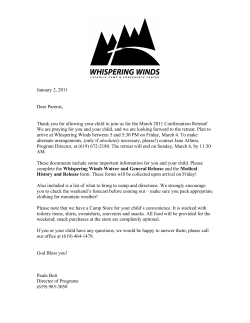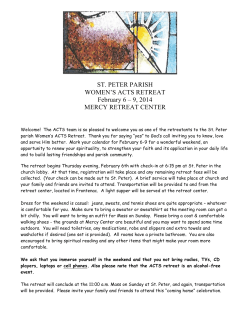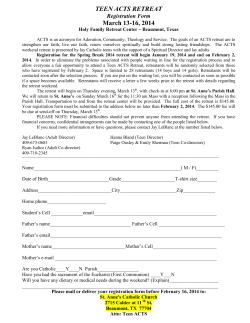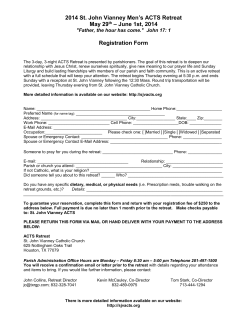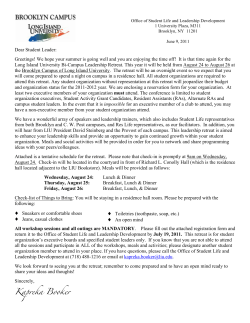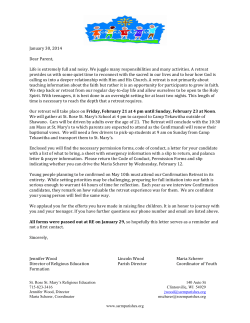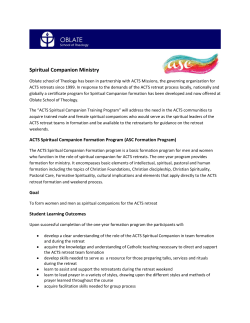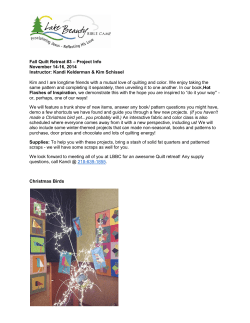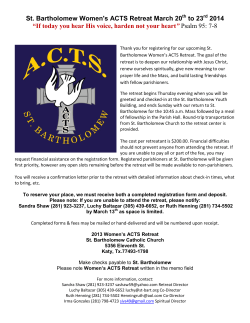
The Cheap Retreat Workbook By Catharine Bramkamp
The Cheap Retreat Workbook By Catharine Bramkamp The Cheap Retreat Workbook copyright 2011 Catharine Bramkamp All rights reserved. No part of this publication may be reproduced, stored in a retrieval system or transmitted in any form or by any means, electronic, mechanical, photocopying, recording or otherwise, without the prior written permission of the publisher. This is a work of fiction. Names, characters, some places and incidents are products of the author’s fevered imagination or are used fictitiously and are not to be construed as real. Except for the advise on wine. Any resemblance to actual events, local organizations or persons, living or dead, is entirely coincidental. It’s not about you. Published by A Few Little Books, Cotati, California March 2011 Cover design and layout by Stacey Meinzen Printed in the United States of America The Cheap Retreat Workbook Introduction Do you long for a writing retreat? Do you read about renewal retreats, exotic retreats, artistic retreats, silent retreats and think - if only I could attend this spa/famous writer retreat in Taos/Bahamas/Thailand, I would be able to really write my novel/screenplay/ poetry collection/thank you notes for the gifts from my most recent wedding Does the idea of a luxury writing retreat shine for you like a mirage, the kind of road shimmer you would experience on an hourly basis if you had to drive from your house to a retreat in Taos to save money? I have those same feelings, I longed for a retreat, a get away. I saved announcements for fabulous retreats led by writers and coaches I admired. I found books on women’s retreats, how to have the perfect retreat. Many involved the beach or the mountains. However, I know myself well enough to understand that a book (Okay, like this one) about retreats or a brochure filled with photos and promises would end up as another excuse to spend precious time planning, strategizing and making lists of what to wear. What I really needed was to spend all that precious planning time working on writing and saving my money for frivolous stuff like groceries. Where did I go for my Cheap Retreat? Home. The opportunity presented itself before the idea for the retreat came to mind. My husband was scheduled to be out of town for the weekend. There were no appointments or obligations penned into my calendar. Instead of feeling blue and asking those rhetorical questions like: Why have I been abandoned? Why didn’t I plan dinner with friends? No one really cares about me at all! I decided to put on my big girl pants and claim this sudden free time as my own writing retreat I announced to my husband that I was creating my own Writing Retreat. After I added the Cheap part, he was more enthusiastic. He muttered something along the lines, of have fun and escaped. I announced my retreat on Face book and got the same reaction: no reaction. But the more I contemplated the idea, the better it sounded. I know that to experience a “real” retreat I’d have to fly somewhere. Flying necessitates thoughtful packing, braving weekend security lines at the airport and hunting down transportation once I landed. A real retreat involves settling into a new room, possibly negotiating with a new roommate, discovering I forgot to pack shampoo. A real retreat would involve polite conversation during breakfast and discovering lunch is not included in the retreat package. The more I considered this effort in the service of a real retreat, the more I thought, I could write in the time it took to fly to the retreat destination. I could write in the time it took to pack my special writer/creative ensembles (and lament that the large sombrero did not fit in my carry on bag). I could write in the time it took to scrounge up cash for the lunch that wasn’t included in the retreat weekend package. I did not need to meet a new roommate, I knew all my roommates intimately (in this case, the dog). The more I thought about it, the more I realized that I could retreat all by myself. I’m happy to report that the Cheap Retreat was a completely successful weekend. I was appropriately dressed. Lunch was included. There were no lines. I encountered no transportation challenges. I was never late. I did it, and I share with you how you can create your own Cheap Writing Retreat too. Do It Yourself Clear the house, now known as the “Retreat Center”. Make sure all family members are far away for the weekend. This is not about them. They are not allowed to call you up and say “since you aren’t doing anything this weekend. . . “ You are doing something this weekend. Plan your retreat for the same time you significant other is out of town for business, out of town for hunting, or just up the coast for abalone. If there are children at home, make sure they are securely out of the way, grandparents come to mind, best friends, camp. Make sure all family members are out of earshot. Clean the Retreat Center before the weekend begins. Do this for two reasons: it’s nice to work in a clean house and it eliminates the house cleaning excuse - you don’t want to be distracted by cleaning when you should be writing. Consider your favorite housecleaning distractions: Is it the dirty grout? Do you need to wash two more loads of laundry? Must you finish up those dishes in the sink? Are those five shirts hanging in the laundry room need ironing right now? Are you distracted by any form of lawn care? Surprisingly, even picking up after the dog seems like an excellent idea compared to writing through a hard section in your book. Make a list of the worst offenders in the household chore department and spend part of Friday afternoon finishing up all those chores that are potential distractions at the Retreat Center. Ban television. When tempted by TV, say, “If I were at a luxury bed and breakfast on an expensive retreat, would I waste the moment on TV?” Your time is precious, don’t waste it. Meal Plan The best meal plan is to plan your meals. Decide what and how you will eat on your retreat. Some writers take this opportunity to cleanse and eat healthy. Some prefer simple meals that can be micro-waved. Some retreat participants prefer take out, some order in. Me, I prefer Ben & Jerry’s. Saturday Breakfast Make sure there’s enough coffee. Alternatively, if you’ve always wanted to drink a latte and write in a neighborhood bistro (Starbucks counts), schedule that activity for Saturday morning. Saturday and Sunday Lunch; Stay in and eat at the Retreat Center. Dine on sandwiches purchased ahead of time or leftovers from Friday night. You can work through lunch, or save a special creativity book or magazine to read while you eat. Dinner: Meet with friends only if they are writers or working on their own creative projects. Think of whom you’d be speaking with at a ritzy retreat; other like-minded writers! Don’t have someone with whom to converse? Find videos or pod casts that will be inspirational and listen to those while you dine. Read one of your creative and inspirational books. Dinner in or out should be simple. If you love to cook or if you want to eat healthy, set up dinner and lunch ahead of time. Stock the refrigerator. If you long for or need a certain comfort food to help you through writer’s block or as a reward when you finally push through that block, stock up on those necessities. Now, with all the necessary nourishment you are ready for the retreat. Work Space Find the perfect place to work. You can work in your own office or your room of your own, but if you don’t have an excellent place to work, this is a great time to wander around the Retreat Center and find the exact right place. Have you fantasized about working in the dining room so you can spread out all your creative, writing generating equipment? Would you like to take over the kitchen table for the same reason? Are you drawn to a corner of the master bedroom? Again, set this up ahead of time. While you’re preparing the Retreat Center, scope out, and clear off, some interesting and/or inspirational places to work. This is a great time to experiment. Do you have a Bagua map? Find the creativity center in your house and work there, does that feel different? Successful? Sample Cheap Retreat Schedule Write up a brochure, it will make your retreat appear more official. (Leave it around the kitchen so you can say, "Oh this? I'm going on a retreat this weekend".) An excerpt from my Wine Country Retreat brochure: Come to the fabulous wine county for a weekend of sipping local wine, nibbling artisan cheese and writing lyrical prose. The bed and breakfast is located in a quite suburb within walking distance of restaurants and bars. The backyard is peaceful between the hours of 10 to 3 when the neighborhood children are in school. Maid service and meals will be provided by a staff that looks uncannily similar to you, the guest. Create a schedule. Write down what you’ve always wanted to do to express your creativity, and gather the materials ahead of time. Go ahead and create an ambitious schedule. I did. I wrote down, by the hour, all the projects and ideas that I never had time to pursue during a typical workweek. Then I ignored everything in favor of what flowed out. There is satisfaction and adventure in ignoring even your own instructions. How delicious to think, “I really should be painting but this collage work is so fascinating I’m staying with it.” If you're going to ignore good advice, it may as well be your own. My schedule included a goal. Your retreat doesn’t need a goal, but to measure if the weekend went well, you may want to consider it. My goal was to jump start a novel that for various reasons had been languishing in the back files of my computer. The goal was to write 5,000 words over the weekend. After two days and a couple pints of Ben & Jerry’s Crème Brulee and Cinnamon Buns I wrote 8,000 words. I celebrated by consuming a new pint of Coffee Heath Bar Crunch. Friday night Arrive at Retreat about 6:00 PM Drink a glass of wine Review the schedule for the weekend Read an inspirational book on creativity Dinner; Pizza (okay, specifically a large Papa Murphy’s Pizza loaded with every ingredient my husband dislikes, large enough for lunch the next day) Read: Fiction or creative book that night. Saturday 7:00 Exercise (I ride a stationery bike and read magazines, just so you don’t think I’m jogging seventeen miles or bulking up at the gym.) Stretch with Yoga moves 8:00 Call my mother (you can notify people like mothers that you are on a retreat and can’t call, but I was too chicken to go that far.) Breakfast: luxurious or simple, your call. I ate cereal both days. Quick walk with the dog (if you have a dog, this is a great excuse to break up the work and/or leave the desk when you feel you can’t write or work any more. It works because the dog will not wait, and will not accept any excuses) 9:00 to 11:00 write 11:20 Take a longer walk or hike a trail or park in your area Lunch and reading 2:00 Nap 4:00 to 6:00 Write 6:15 walk the dog (again!) 7:00 glass of wine and reading 8:00 dinner Brief poetry moment – reading or writing Sunday 7:00 Exercise and stretch 9:00 Breakfast Walk dog 10:00 to 11:00 collage or painting or poetry Play music or one of the pod casts on memoir 12:00 longer walk with dog, Park, Spring Lake 2:00 Nap 4:00 to 7:00 write 7:30 glass of wine 8:00 dinner 3 hours of writing for this day How to Do It A goal is great, but don’t become overwhelmed by a goal that is unrealistic. The ultimate benefit of a Cheap Retreat is to discover what you love as well as discover what kind of creative endeavors flow out when there is space and time. A good trick is to set a goal that you know you can beat. Why not? Who is monitoring you? No one. So set the bar low and sail over it by Sunday afternoon. Reward your efforts! When you sit down to write, work to avoid answering email or moving onto Face book “just to check” or twittering friends about how much you are enjoying your retreat. The only exception to that rule is if you have formed – ahead of time – a support group on twitter or Face book and you pledged to post the growing word count for the weekend. In that case, by all means, post to your favorite social media outlets. But wait until the scheduled writing time is finished. Post the new word count as you drink your celebratory glass of wine. The dress code at this retreat center should be pretty casual. This is biggest benefit to the Cheap Retreat; no uniform, no dress requirements, you can walk through the lobby in your robe. If you plan it particularly well, you’ve eliminated the need to leave the Retreat Center at all. Experiment with wearing no make up. Go ahead rub your face, scrape your hair into a scraggly ponytail – ah, the liberation of creativity. Stuck? Practice ten minute writing. At the end of this book are writing prompts to help you along. If you are particularly challenged and nothing, not even chocolate will help, give up. If you are feeling active, exercise or take a walk. If your feeling a little done in, then go ahead and take a nap or just go to bed. The solution to your writing dilemma will often present itself to you the next morning, and you have all morning to take dictation from your subconscious! The Take Away from the Cheap Retreat Ideally the retreat is a rehearsal. What happened when you did, indeed, have all day to write? All weekend to write? This is great chance to experience what is possible for you. Allow yourself to really experience the endless time of a weekend. The retreat can create new deadlines for you and allow you to see what really is possible. Can you write all day? Yes? No? If you can’t write all day, do not label that new fact as a failure. What you’ve learned is where your natural stopping places occurred. I learned that even with a whole morning at my disposal, I can only work on a project for about an hour and half to two hours at a stretch, then I need to take a break and do something else. I never did get the dog to the park, we just walked around the neighborhood. From these experiments, take what you learned and see if you can schedule it into your day or week. Review your initial schedule. What did you love to do? What did you want to do versus what you wrote down? I fully intended to paint (Sunday, 10:00 to 11:00 collage or painting. Write poetry. Play music or listen to one of the pod casts on writing). I blew all those options off to work on the book. There is so much to do during our average week, that creativity often slides to the back burner, “someday when I have more time”. To add to the challenge is our culturally inflicted notion that to spend time on creativity is tantamount to goofing off. Workshops and retreats at least carry the patina of officialdom. If the retreat is expensive and difficult to reach, then the value of your work at the retreat correspondingly increases. You PAID to do work at this retreat so the work must be good. Often what we really need is time and quiet. I found that naming my time – a Writer’s Retreat - as well as consciously focusing on the time as special and valuable, did the trick just as well as shelling out $1,000 plus dollars. The Cheap Retreat worked for me. It can work for you too. Tell Ben & Jerry hi. Prompts Time rolled forward like a flip of the dice. Sometimes it came up snake eyes. Where do you want to go? Down the block? The mall? A foreign country? Research a foreign country that always intrigued you and make up an itinerary, follow some postings about traveling. Once you learn about your fantasy trip. Do you still want to go? What would a character do if they finally achieved the trip to their fantasy location, but the fantasy turned into a nightmare? Have you noticed that the stories most often told about travel experiences are ones bordering on disaster? Perfect trips and experiences are easily and quickly dismissed, “We had a great time.” But bad travel stories? Those are the stories we repeat over and over. We all have bad travel stories; the Grand Canyon was not so grand, the Great Wall was not so great. Write about it; a cranky description of a place makes for entertaining writing. We recently returned from Egypt. Best part of the trip? The sandstorm that forced us to cancel all our plans and huddle inside and watch cushions from the pool furniture get hurled into the abandoned outdoor bar. It was great. Fan literature. There is a booming industry of fan literature based on movies, books or television shows. The results rest in blogs and corners of the Internet, but for inspirational purposes there is no reason you can’t write up a continuation of your favorite show or book. Jane Austen fans publish their thoughts on Mr. Darcy and his marriage to Elizabeth. Star Trek fans have been writing novels and scripts for years based on the original characters. Some writers take the characters of popular fiction and television and pair those characters up differently, with obviously different story lines. What’s around you right now? Make a catalogue of the items that surround you right now, today. What do they say about you and about the times in which you live? How do houses reveal character? What is it about your grandmother’s home that is an exact reflection of her and who she is and where she’s been? How are your friend’s homes different from your own? Do you find that good or bad? A wonderful feature in the play Mame, is that for every transition in Mame’s life; she redecorates her New York apartment. It is easy for the audience to follow where she is emotionally as well as financially – just through her living room furniture. Mame is a great retreat film. Consider haunted houses, there’s a clear reflection of the house holding the energy of bad or good energy and certainly how the residents feel about it! (You know these stories; Poltergeist, Amityville Horror and both the Adams Family and the Munsters lived in homes that reflected their propensities.) Hope is the thing with feathers and I am allergic. (Emily Dickinson, Hope is the Thing with Feathers) A hospital staff of Vampire doctors. Detective in a soap opera. What would you do with a gazillion dollars? (It used to be a billion dollars but we are accounting for inflation). This can be a list, a story, a cautionary tale. Change point of view. Write a paragraph from your point of view. Now write up the same incident from another point of view (Mrs. Dalloway by Virginia Woolf, The Hours by Michael Cunningham, The Sound and Fury by William Faulkner). This is a powerful method for story telling. What is your perfect day? Track this perfect day over the course of the next ten years, make tabs or notes so you can return to this and consider how the idea of perfect changes as you age. Persistence in the face of ordinary despair. Not good enough for a world that no longer exists. Six-Word Memoirs: The Legend The six-word memoir legend is that Hemingway (not a verbose writer to begin with) was once challenged to write a story in only six words. His wrote, “For sale: baby shoes, never worn.” The original collection of six word memoirs is titled Not Quite What I was Planning collected by the editor of Smith Magazine. Visit the web site for the current inspiring crop or pick up the book. The Six-Word Memoir is at its heart, another form of Haiku and a less scary way to write what is essentially a poem. What kind of six-word memoir can you write? Flash Fiction is a short, short story. Some other descriptors are: furious, sudden, postcard or micro fiction. The goal is to tell a full story with a beginning, middle and end in as few words as you can, anywhere from 75 words to 1,000. A short story usually contains about 2,000 words and up. (For those of you counting words). Another version of this genre is Bright flash – a story in 240 words, roughly a page. Describe your worst day ever. That’s all you need for a prompt. Describe your happiest day ever (for a brilliant description of this, read the second act of Our Town) Don’t compare your insides with someone else’s outside. Poetry magnets are ubiquitous tiny magnets covering countless refrigerators in summer rentals. Sometimes the configuration of words is a message; sometimes it makes no sense at all. But poetry magnets are a great way to open your mind to different words and a different way of organizing those words. Poetry words are also available as a software program (Mariner, Desktop Poet) so any time you need to play with words, this is a fun thing to do. You can also make poetry words by gluing words or writing them on raffle tickets (just because the size is helpful). For more inspiration of this sort, read Poemcrazy by Susan Wooldridge. Shuffle words, record words, keep a list of words in your idea journal. Words are fabulous and deserve our attention. Practice saying “I’m not writing about you.” I know what I think I know but I’m willing to set it aside to learn something new. Write in your own voice. Now this is an easy thing to say, just write in your voice – well how? Voice is how you express yourself. Do you use regionalism? Do you have short hand phrases that stand in for full sentences when speaking to friends and family? How does that language translate to the page? At all? Do you have a way of describing scenes that reflect your own prejudices and propensities? For instance, a girl describes her shopping experience differently than a boy would describe the same shopping experience. How would you relate to a four-foot chicken as opposed to a one-foot chicken? Describe your holidays. David Sedaris did this brilliantly in Holidays on Ice. While your family may not be as cleverly dysfunctional as David’s, there are quirks and the stresses of the holidays bring out the worst or sometimes the best in family members. Write up your own holiday story, then ask around. Do your holiday memories match up with your sibling’s memories? Can you compare your interpretation with your parents or grandparents? (There are too many holiday stories and examples to list; this is a very popular topic for books, films and television specials. Why?) If you were to re-write that essay, what I did on my summer vacation but write how you really felt about it, what would you say? (Thank you to Natalie Goldberg, Writing down the Bones) Describe your best friend; do not share this information. Describe your ideal mate – who would they be? Are you with your ideal mate? See why we don’t share this information? Have you ever attended a Renaissance Faire? Consider the participants, do they really belong in another time? Do you? Write a letter to your future self and work hard to remember where you put it so you can read it in ten years. Describe the car you want, right now. Describe your life as if a foreigner was reviewing it, someone with a different religion or from a different universe. What would look odd to them? What would be the same? Quiet like a fish (Chicken Run) Dude! - (Dude, Someone Stole my Car) All families are experts in revisionist history I support public transportation; I just don’t like busses. Standing in a foreign country, gazing at the same moon. He is now blind, his wife reads to him from their travel journals. Who is your worst enemy? Describe that person; make something terrible happen to them. Redeem them only to assuage your own soul. Build the perfect beast. Old fashion sprinklers sounds - chink, chink, chink. (Lull me to sleep) If you lived alone, what would you stop doing? What would you start doing? Do we do things that keep the peace in a family or roommate situation that we’d just assume drop? Do we do things or create things that don’t serve us at all but do serve the other people in the house? Would you really stop showering? What makes you Angry? Injustice? Parents Siblings? Dirty Dishes? Write about how you express anger. Why is there more to the anger? Do those dishes trigger something else? Like why does that other person – or people – get to leave all of their stuff all over the house and you only get to clean up after them? If you still have that list on what makes you angry, reverse engineer it. If Social injustice makes you angry what does that say about your values? Do you value justice so much that any hint of injustice sends you into red-face apoplexy? Then it’s probably very important. It’s quite helpful to know what’s important. Probably one of the biggest regrets we have is when we listened to other more sensible people instead of following your own instincts. What do you wish or want to do that other people – very well meaning people, talked you out of and now, yes, you are sorry. Read Jane Austen’s Persuasion for a great example of what happens when a young woman listens to other people and not her own heart. What do you want? What do you really want? (I can’t help it, there is a great comedian who in her routine describes her encounter with a Self Improvement Guru who is promoting an expensive seminar, and the comedian answers the existential question, what do you want in your life? with the practical reply, “A new car.” “No, no!” Countered the frustrated guru, “what do you REALLY want?” And she answered, “A new, NEW car?”) We are talking big wants, huge wants, fill the room wants. If you can’t get your wants large enough to fill the room, take it slowly and want in stages like taking a rest between filling a rather large balloon with your own lung capacity. I want to reach the sky I want to be president of the United States I want to be a movie star I want to win a million dollars I want to live in a castle I want to be a famous author What will happen after you get your big want? Where do you get your ideas? Writers can’t help themselves. Ideas are everywhere, boiling up, floating down, racing by. Just grab them and wrestle them to the ground. See how easy that is? But what do you do with an uncooperative but distracting idea once you have it? Drag the snarling hyperactive thought in the coral of folders on your computer or onto pieces of paper that you train to jump into a regular folder or envelope. You can access these thought later when they’ve calmed down. Keep them all, because you never know when you need a good new untrained idea. Vacation means squandering time instead of spending endless days working to save it. The Simpson’s Reverend Lovejoy responds to Ned Flanders, during an annoying phone call: "Ned, have you considered any of the other major religions? They're all pretty much the same." Are all the major religions the same? What does heaven look like? Are there rules? Comfortable yet stylish shoes? Dress code? How has technology changed how you relate to the world? If you don’t know any differently, ask around, how has it changed your parents, grandparents? And don’t discount “old” technologies. Electric lights and telephones were as revolutionary as the Internet, maybe more so. So consider that. In novels the times and the technology help create conflict, flaws in the plot, tension. Collect poetry or quotes, or both. Fabulous lines from poems make great prompts and are great for inspiration specifically and in making your awareness of life fuller and more interesting in general. I know, poetry is boring and fussy and crammed down your throat in school to no good end. I invite you to re consider by checking out the poetry section, you know you skipped right past it on the first thumb through of the book, but look again, it’s not as boring as you think. Read poetry by Billy Collins. Writers make their own myths and legends and then surround them with plausible plots. Harry Potter, Golden Compass, Lord of the Rings, Narnia. Imagine your own myths and your own worlds. The challenge is staying true to your own created world, even myths and legends have their own rules, their own physics, so don’t betray the systems you yourself set up. Who is good at this? CS Lewis (Narnia) Tolkien (The Lord of the Rings) Less adept? The Harry Potter series and The Dark Materials trilogy, read both, see how some authors have a complete grip on their invented land and others veer off, not quite adhering to the rules of their own systems. Keeping your own rules is as difficult as following someone else’s. What will you never do again? Write about either a mistake, or an experience (never smoke, never eat at Denny’s, never get back on that horse) and, what do you know you will never do as long as you live? Here are a few examples from my “I Will Never” list: Learn bird identification or create birdcalls Cook pot roast Sew my own wardrobe Play basketball Hang glide Parachute Grow my own food Live in a yurt Live in the city Move in with my mother Sometimes what we won’t do is as revealing as what we will do. Also in inventing characters, a few well-placed observations can be as interesting as positive features. Use an old plot for a new work. Writers do it all the time. Jane Austen’s work has been re-written over and over (Clueless, Bride and Prejudice), Pride Prejudice and Zombies being ill conceived but popular. Jane Smiley re-wrote King Lear in her Pulitzer winner novel 1,000 Acres. Romeo and Juliet has been re-worked to death; you can dance it, sing it and run car races through it. The tale of doomed love is quite durable. So what about a modern Macbeth? As You Like It? Othello? Shakespeare may have taken the best plots, but he didn’t come to them naturally, he used Greek and Roman myths and Eastern legends. You can borrow from Shakespeare knowing he himself borrowed. Virginia Woolf called them Moments of Being. Life is a series of moments strung together. What do you think? History is written by the winners. History is also written for its audience. So if you are a school child in America, you will read one version of WWII. IF you are a school child in France, you will read a slightly different version of WWII and if you are a school child in Germany you will read an even more different version of WWII. If you are a school child in Japan you may not read about WWII at all. So knowing this, how can we get at the truth of history? Read the novels. Read the different versions of the same war from entirely different experiences. What does the other side see? What do you imagine they see? Are you currently living in a place where your view of history is different than what is presented in the news? It is very hard to come to an actual, irrefutable truth about anything involving the conflicting agenda of humans. Or can you? Can you write a truthful history? Do you want to? What would that look like and who can be trusted to tell the absolute truth? Expressing your experienced truth is very much an act of courage. Look at history from another point of view. Examples of this are Gone with the Wind by Margaret Mitchell, The Red Badge of Courage by Steven Crane, Shooting An Elephant by George Orwell. If you want facts, read history, if you want the truth, read a novel. Monsters at the edge of the world Look at an old map of the 15th and 16th century. What lurks along the edges, where the land sort of fades away and the ocean boundaries are uncertain? Monsters, dragons, serpents. Why is the unknown populated with scary things? Why is the unknown dangerous? What if the unknown is marvelous? What kind of world would it be if the edges of the unknown were populated by interesting cultures, exotic birds and delicious fruit? What if you were the Mary Kay consultant to a cliental of monsters, vampires, demons and zombies? What would be your best sellers – white foundation? Sunblock? What would you recommend for a best look for a zombie? (Edward Sissorshand, Beetlejuice) What happens when you get what you want? “Too much of a good thing is wonderful” - Mae West (Bedazzled, The Merchant of Venice, Faust) Do or do not, there is no try -Yoda What would you do if you weren’t writing? Are you a graphic artist? Would you rather be writing graphic novels? Creating music? Making origami cranes for good luck? It’s not an idle question, allow yourself time to explore all sorts of creative outlets just to be sure you’re spending your valuable time on the right one. Helpful, Creative Books I love e-readers, but for this event you may want to take a trip to your independent bookstore or a used book store (to stay with the Cheap theme) and pick up these marvelous books so you can experience the creativity, take the book into the bath and read what will work for you. Don’t Write Like You Talk Writing Down the Bones and Wild Mind - Natalie Goldberg Writing the Life Poetic - Sage Cohen The Life Organizer - Jennifer Louden Living Juicy: Daily Morsels for Your Creative Soul – SARK After you participate in your own Cheap Retreat tell me what you did and what you accomplished. Sign up for my monthly newsletter. . . Need Help With Your Writing Project? Drop me a line: Bramkamp@yahoo.com Catharine Bramkamp is the author of Don’t Write Like You Talk: A Smart Girl’s Guide to Writing and Editing (3L Publishing). She holds two degrees in English, published hundreds of newspaper and magazines articles, a handful of novels and two essays in the Chicken Soup for the Soul anthologies. She is an adjunct professor of writing for two colleges and is a successful writing coach. Visit her at www.YourBookStartsHere.com Helpful, Creative Books I love e-readers, but for this event you may want to take a trip to your independent bookstore or a used book store (to stay with the Cheap theme) and pick up these marvelous books so you can experience the creativity, take the book into the bath and read what will work for you. Don’t Write Like You Talk Writing Down the Bones and Wild Mind - Natalie Goldberg Writing the Life Poetic - Sage Cohen The Life Organizer - Jennifer Louden Living Juicy: Daily Morsels for Your Creative Soul - SARK When you participate in your own Cheap Retreat tell me what you did and what you accomplished. Sign up for my monthly newsletter. . . Need Help With Your Writing Project? Drop me a line: Bramkamp@yahoo.com Catharine Bramkamp is the author of Don’t Write Like You Talk: A Smart Girl’s Guide to Writing and Editing (3L Publishing). She holds two degrees in English, published hundreds of newspaper and magazines articles, a handful of novels and two essays in the Chicken Soup for the Soul anthologies. She is an adjunct professor of writing for two colleges and is a successful writing coach. Visit her at www.YourBookStartsHere.com
© Copyright 2025
